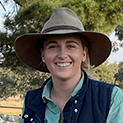Genetic expression refers to the process by which information from a gene is used to synthesise functional gene products, such as proteins and RNA molecules, which in turn perform various functions within an organism. It’s the step between a genotype and a phenotype (observed genetic trait) and is the primary cause of phenotypic variation.
In livestock breeding, understanding genetic expression and gene-environment interactions is crucial for improving desirable traits. Breeders aim to enhance traits such as growth rate, milk production, wool quality, disease resistance, and reproductive efficiency.
In this blog, we will provide an overview of the environmental factors affecting gene expression.
What is gene expression
The gene expression process involves two main steps:
- Transcription: The DNA sequence of a gene is transcribed into messenger RNA (mRNA).
- Translation: The mRNA is translated into a protein that performs a specific function in the cell.
Transcription is subject to tight gene regulation and can be influenced by various internal and external factors, including:
- Epigenetic modifications: An epigenetic modification is a chemical change to the DNA or histone proteins that affects gene expression without altering the DNA sequence.
- Transcription factors: A transcription factor is a protein that binds to specific DNA sequences and controls the rate of transcription.
- Environmental factors: Environmental conditions such as nutrition, stress, and temperature can influence gene expression.
Each of these factors are linked. They influence each other and can have long-lasting effects.
Measuring gene expression
Gene expression can be measured using various methods:
- Quantitative PCR (qPCR): Quantifies specific RNA levels with high sensitivity and specificity. qPCR has been used to assess the expression of heat shock proteins in cattle under heat stress conditions.
- RNA Sequencing (RNA-Seq): Provides a comprehensive analysis of the transcriptome by sequencing RNA converted to cDNA. RNA-Seq can be used to identify differentially expressed genes in dairy cows with high milk yield compared to those with lower yield.
- Microarrays: Allow for simultaneous analysis of thousands of genes by hybridising cDNA to probes on a chip. Microarrays are more specific and can provide a comprehensive gene expression profile.
- Northern blotting and In Situ Hybridisation (ISH): Provide information on RNA size, abundance, and spatial distribution within tissues. These methods have been used to assess muscle development in livestock, but not used as often these days as Microarrays and RNA-Seq.
What is Epigenetics
Epigenetics is the study of heritable changes in gene expression that do not involve alterations to the underlying DNA sequence. Think of a tap, these changes can affect how genes are turned on or off or the amount they are on. These are often influenced by environmental factors, lifestyle, and developmental stages.
Optimal diet, favourable climate conditions, and good management practices can enhance the expression of genes related to growth, milk production, and meat quality, leading to healthier and more productive animals.
Environmental influences
Diet
Diet can affect genetic expression in livestock in several ways. Nutrient availability, such as vitamins and minerals, is crucial for enzymes that regulate gene activity. For example, a diet supplemented with selenium in sheep can enhance the expression of genes related to antioxidant defence, improving overall health and wool quality.
Certain foods can alter DNA methylation and histone modification. For instance, feeding dairy cows a diet rich in methionine, an essential amino acid, has been shown in one study to lead to changes in DNA methylation that improve milk production and quality. Nutrients can activate or inhibit pathways that change gene expression. Omega-3 fatty acids in the diet of beef cattle can reduce inflammation by affecting the NF-κB signaling pathway, leading to changes in the expression of genes related to muscle growth and fat deposition.
Additionally, diet affects hormone levels, which can regulate genes by acting as transcription factors. A diet high in energy and protein for lactating dairy cows increases insulin and growth hormone levels, which in turn regulates genes involved in milk synthesis and nutrient partitioning. On the other hand, restricted feeding or undernutrition can trigger the expression of multiple genes related to stress, affecting growth and reproductive performance.
Discover how Sheep Genomic Testing can optimise breeding by leveraging the effects of diet on gene expression for better livestock outcomes.
Climate
Climate significantly impacts gene expression in livestock, influencing their health, productivity, and overall well-being. For example, Weller et. al 2021 found a significant association between the month of birth, season of pregnancy, and heat stress index of females, with the performance of their F2 and F3 progenies. This suggests that heat stress during pregnancy affects the performance of offspring, regardless of life circumstances in at least the last three generations.
Learn more about Cattle Genotyping Services to understand how climate-specific traits can be optimised for Australian livestock.
Livestock management
Like diet and climate, livestock management has a significant impact on gene expression. Providing a balanced diet with adequate vitamins, minerals, and nutrients is crucial as it affects genetic expression and output. This also extends to the selection of replacement sires and dams. For example, a sire from the northern hemisphere with amazing estimated breeding values may produce high-performance offspring in those environments but fail to perform in Australia due to dramatically different climate conditions.
How XytoVet can help you navigate gene-environment interactions
XytoVet is perfectly positioned to help you gain a better understanding of your livestock’s genetic profile and the relevant DNA variants affecting gene expression.
If you’re interested in harnessing the power of genotyping to make better breeding decisions, don’t hesitate to reach out.
Enquire now and let our team of experts guide you towards unlocking the genetic potential of your animals and pursuing your livestock management goals.










